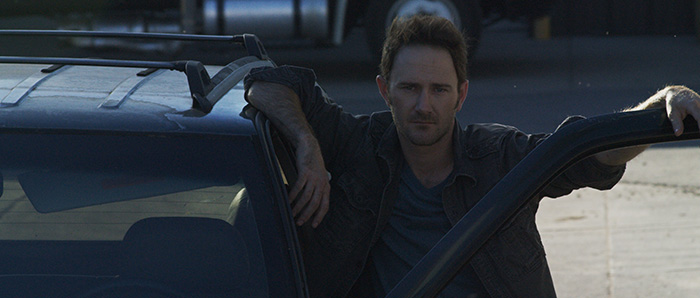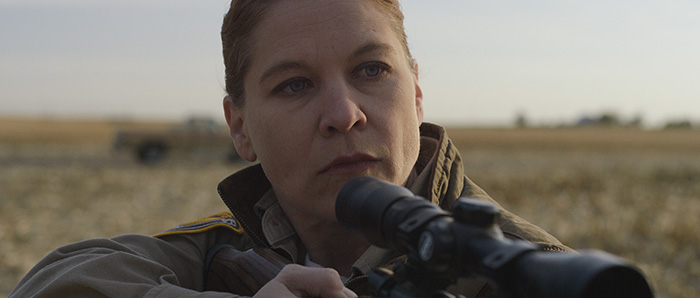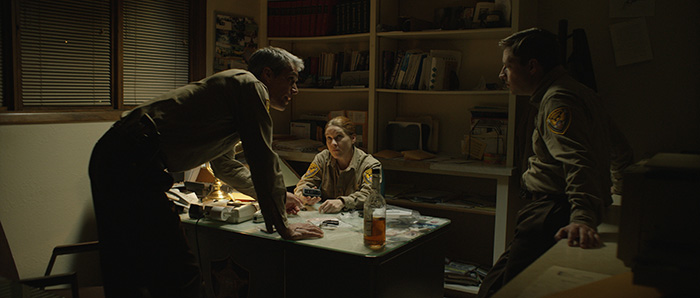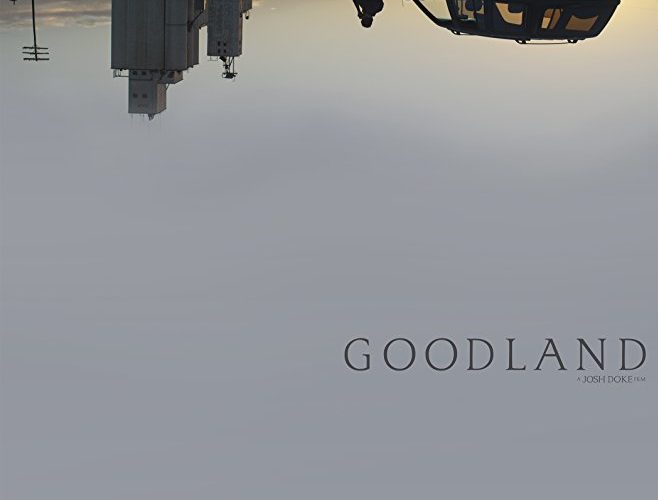There’s nothing like some yokel conversation to introduce a film’s environment while also foreshadowing the ensuing plot. It’s easy to dismiss the aging gas station owner and his even older customer’s back and forth about a wolf seen a few miles away because neither is listening to the other. The former explains how it was probably just a coyote before the latter comes to his own epiphany that the game warden will end up finding a coyote. We want to laugh except for the fact that their delivery is arid dry, their performances straightforward without a notion of breaking from steely façades in morning gossip. These are two citizens of Goodland, Kansas and perhaps perfect exemplars of that label: slow yet tenacious, always serious and ready to fight.
We assume these men are merely color populating the background of the scene’s true intent: to provide Ergo Raines (Matt Weiss) his entrance. This photographer is passing through, asking about lodging options to rest a few days before moving on. But since we soon meet Sheriff Gaines (Cinnamon Schultz) on her way to meet that game warden, we realize everything we’re going to hear and see onscreen is there for a reason. While it may all serve to proliferate red herrings, we cannot assume it won’t ultimately prove crucial to the whole. Writer/director Josh Doke has meticulously tightened his script in this way to ensure that anything can shift the main plot off course at any given moment. Every new revelation has the potential to enhance his mystery.

It starts with numerous questions surrounding an unlikely dead body. Gaines’ naïve deputy (Rick Folten) identifies the corpse with relative ease because he may have been the last person to see the drifter alive after driving him outside of town upon sobering up from an altercation the night before. Somehow this stranger wandered back, procured more alcohol, and found himself the casualty of a heavy machinery accident. But while the evidence looks to secure the case as open and shut, the timeline doesn’t add up. The only way he could have gotten liquor was from a local or a friend. Maybe the townie he fought sought revenge or maybe this supposed vagrant was never actually alone. If the latter, only one other equally suspicious newcomer had arrived: Ergo.
Goodland splits its focus in half, crisscrossing between its two leads as they move closer and closer to some yet unforeseen convergence. Ergo roams the town with his camera, befriending the motel’s receptionist (Sara Kennedy’s flirtatious Ida) and running afoul of everyone who rejects outsiders as a rule. Gaines follows the few leads she has to acquire other information to assist her in confirming a gut feeling that keeps saying this “accident” was anything but. She confides in her old boss (Kip Niven’s retired Sheriff Hal Bloom), putting her reservations out into the open along with the accounts of those she confronts along the way. And Ergo does the opposite, closing himself off to Ida despite her obvious interest to force our assumptions to run wild.

The result is a tense thriller with noir undertones revealing a more complex web than we ever could predict. Not every discovery is tough to guess, but each carries another question to distract us from a desire to pat ourselves on the back or presume we’ve cracked the case. There’s always something new to augment our understanding of the characters (Gaines being a recovering alcoholic or Ida’s attachment disorder) while also propelling the plot forward in the process. It’s these personal morsels of intrigue that motivate them to act in ways they otherwise wouldn’t, each step serendipitously helping (but never unbelievably so) to move past whatever roadblock had previously been in their way. The ten-year gestation period for Doke before launching his 2015 Kickstarter campaign obviously wasn’t wasted.
He includes more than meets the eye with story or acting. I initially thought Schultz too self-serious, her Sheriff Gaines moving towards generic law enforcement cliché (think Harry Truman in “Twin Peaks” without the levity allowing us to be in on the joke). But then she meets Ergo, turning on the charm to disarm him into saying something he might not want to share. It’s a brilliant subversion of the Gaines we had thus far seen — one proving Schultz’s stoicism was crafted in earnest. Without knowing anything about her character’s background besides anecdotal details and a mutual respect for Hal, this demeanor shift was invaluable. It cements her personality, expertise, and professionalism. She’s not the smartest in the room because Doke needs her to be. She simply is.

This means those smarts (mostly) won’t be used outside of her individual intent. Doke won’t leverage her to trip Ergo up because his trajectory is more or less independent of hers. Their convergence arrives by fate’s hand rather than their own manipulation. While this is great for keeping us on our toes as far as diverting attention two ways, it guarantees the ending can’t be as satisfying as the whole might deserve. That’s not to say it isn’t good — the cut to black honors the preceding tale by being just as deliciously bleak. But it’s so abrupt that I felt let down. So many captivating loose ends concerning Ergo are closed with a single blow, leaving me wondering what could have been rather than excited about what was.
And I say Ergo because this isn’t quite the case with Gaines. Maybe it’s an intentional maneuver to insulate her for sequel potential, but the even split between the two stops at the climax with her Sheriff being pushed to the periphery. This is a shame because all that time spent following her process made it so I found myself much more engaged with her character’s progression. I counted on the two being treated with the same amount of importance only to realize Ergo was slowly taking the spotlight for himself. His journey works as a complete arc and earns the attention it receives considering what he’s asked to do for survival, but it sadly does those things at the expense of permitting Gaines a comparably satisfying send-off.
Goodland is now in limited release.

